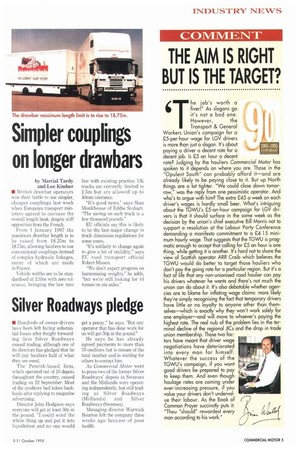THE AIM IS RIGHT BUT IS THE TARGET?
Page 7

If you've noticed an error in this article please click here to report it so we can fix it.
The job's worth a Fiver!" As slogans go it's not a bad one. However, the Transport & General Workers Union's campaign for a £5-per-hour wage for LGV drivers is more than just a slogan. It's about paying a driver a decent rate for a decent job. Is £5 an hour a decent rate? Judging by the hauliers Commercial Motor has spoken to it depends on where you are. Those in the "Opulent South" can probably afford it—and are already likely to be paying close to it, But up North things are a lot tighter. 'We could close down tomorrow," was the reply from one pessimistic operator. And who's to argue with him? The extra £45 a week on each driver's wages is hardly small beer. What's intriguing about the TGWU's £5-an-hour campaign for LGV drivers is that it should surface in the some week as the decision by the union's chief executive Bill Morris not to support a resolution at the Labour Party Conference demanding a manifesto commitment to a £4.15 minimum hourly wage. That suggests that the TGWU is pragmatic enough to accept that calling for 25 an hour is one thing, while getting it is another. It's hard not to share the view of Scottish operator ARR Craib which believes the TGWU would do better to target those hauliers who don't pay the going rate for a particular region. But it's a fact of life that any non-unionised road haulier can pay his drivers whatever he wants and there's not much the union can do about it. It's also debatable whether agencies are to blame for inflating wage claims: more likely they're simply recognising the fact that temporary drivers have little or no loyalty to anyone other than themselves—which is exactly why they won't work solely for one employer—and will move to whoever's paying the highest rate. The real nub of the problem lies in the terminal decline of the regional JICs and the drop in trade union membership. Those iwo factors have meant that driver wage negotiations have deteriorated into every man for himself. Whatever the success of the TGWU's campaign, if you want good drivers be prepared to pay to keep them. And even though haulage rates are coming under ever-increasing pressure, if you value your drivers don't undervalue their labour. As the Book of Common Prayer succinctly puts it: "Thou "should" rewardest every man according to his work." 1905-1995
VAILIRSA111




































































































































